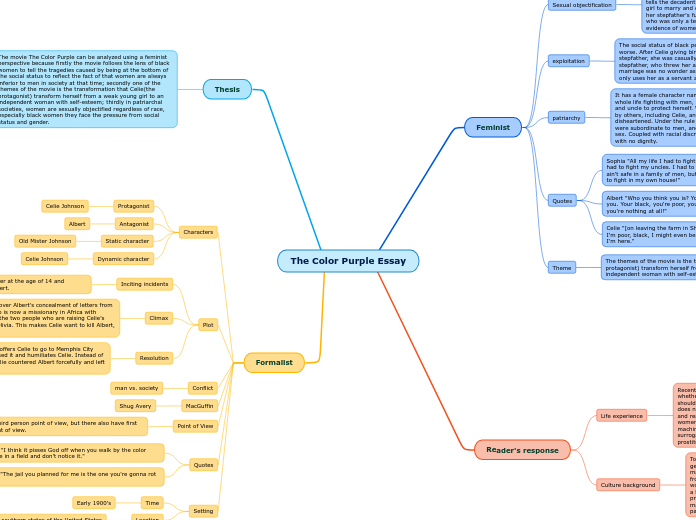The Color Purple Essay
Formalist
Setting
Location
The southern states of the United States
Time
Early 1900's
Celie "The jail you planned for me is the one you're gonna rot in."
Shug "I think it pisses God off when you walk by the color purple in a field and don't notice it."
Point of View
Mainly is Third person point of view, but there also have first person point of view.
MacGuffin
Shug Avery
Conflict
man vs. society
Plot
Resolution
At a family dinner, Shug offers Celie to go to Memphis City together, but Albert refused it and humiliates Celie. Instead of being silent this time, Celie countered Albert forcefully and left with Shug.
Climax
Shug helps Celie discover Albert's concealment of letters from her sister, Nettie, who is now a missionary in Africa with Samuel and Corrine, the two people who are raising Celie's children, Adam and Olivia. This makes Celie want to kill Albert, but Shug stop her.
Inciting incidents
Celie got raped by her step father at the age of 14 and married her to a man called Albert.
Characters
Dynamic character
Static character
Old Mister Johnson
Antagonist
Albert
Protagonist
Celie Johnson
Thesis
The movie The Color Purple can be analyzed using a feminist perspective because firstly the movie follows the lens of black women to tell the tragedies caused by being at the bottom of the social status to reflect the fact of that women are always inferior to men in society at that time; secondly one of the themes of the movie is the transformation that Celie(the protagonist) transform herself from a weak young girl to an independent woman with self-esteem; thirdly in patriarchal societies, women are sexually objectified regardless of race, especially black women they face the pressure from social status and gender.
Reader's response
Culture background
To carry on the family line is very important to the older generation of Chinese. In some Chinese marriages, the woman may have a medical condition that temporarily prevents her from pregnancy, then the man's parents will try to treat the woman with various folk remedies. Moreover, if the child is not a boy, the man's parents will force the woman to continue pregnant until she has a son. During this period, the woman may be verbally assaulted or even abused by the man's parents.
Life experience
Recently, there has been a national debate in China about whether surrogacy should be legalized. I am on the side that should not be legalized, because the current Chinese society does not have the conditions to make surrogacy really legal and reasonable. Because some poor countries open surrogacy, women at the bottom of the class have become fertility machines, or even imprisoned to give birth continuously. Open surrogacy persecutes disadvantaged women even more than prostitution.
Feminist
Theme
The themes of the movie is the transformation that Celie(the protagonist) transform herself from a weak young girl to an independent woman with self-esteem.
Quotes
Celie "[on leaving the farm in Shug's car, shouting to Albert] I'm poor, black, I might even be ugly, but dear God, I'm here. I'm here."
Albert "Who you think you is? You can curse nobody. Look at you. Your black, you're poor, you're ugly, you're a woman, you're nothing at all!"
Sophia "All my life I had to fight. I had to fight my daddy. I had to fight my uncles. I had to fight my brothers. A girl child ain't safe in a family of men, but I ain't never thought I'd have to fight in my own house!"
patriarchy
It has a female character named Sophia, who spends her whole life fighting with men, fighting with her father, brother, and uncle to protect herself. When her husband, Harpo, is abet by others, including Celie, and punches her, she feels disheartened. Under the rule of patriarchal society, women were subordinate to men, and women were considered inferior sex. Coupled with racial discrimination, it left black women with no dignity.
exploitation
The social status of black people is low, and black women even worse. After Celie giving birth to two children for her stepfather, she was casually married to a strange man by her stepfather, who threw her away like garbage. Celie’s new marriage was no wonder as she thinks. Her husband, Albert, only uses her as a servant and a sexual instrument.
Sexual objectification
In the movies, men treat women like replaceable everyday objects, who get rid of the old ones and marry a new young girl to come back. After Celie leaves Albert, Old Mister Johnson tells the decadent Albert to hurry up and find another young girl to marry and do his chores. Moreover, when Celie attended her stepfather's funeral, she met her stepfather's young wife, who was only a teenager and holding a baby. These are evidence of women being sexually objectified.

